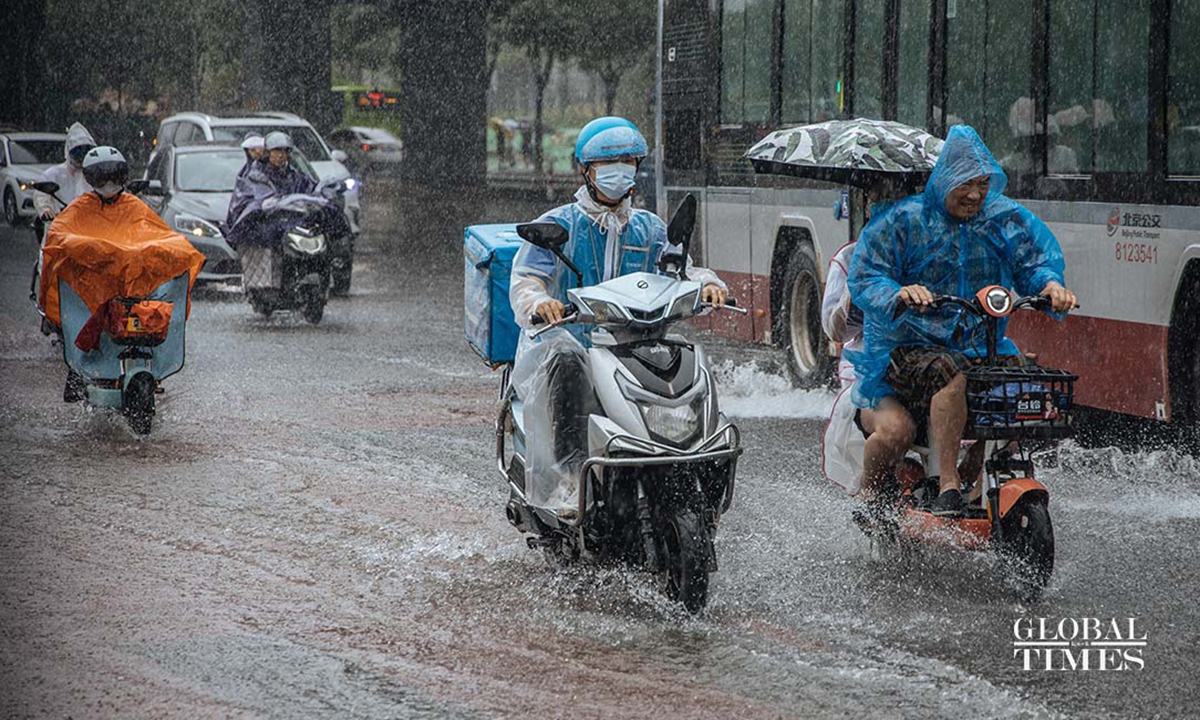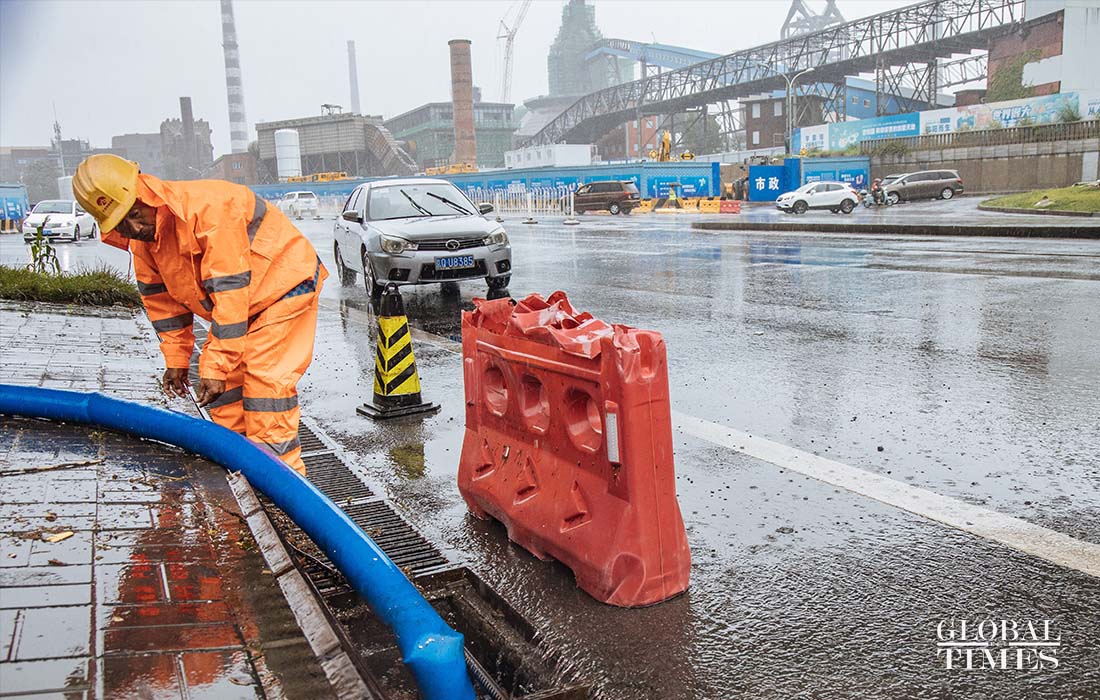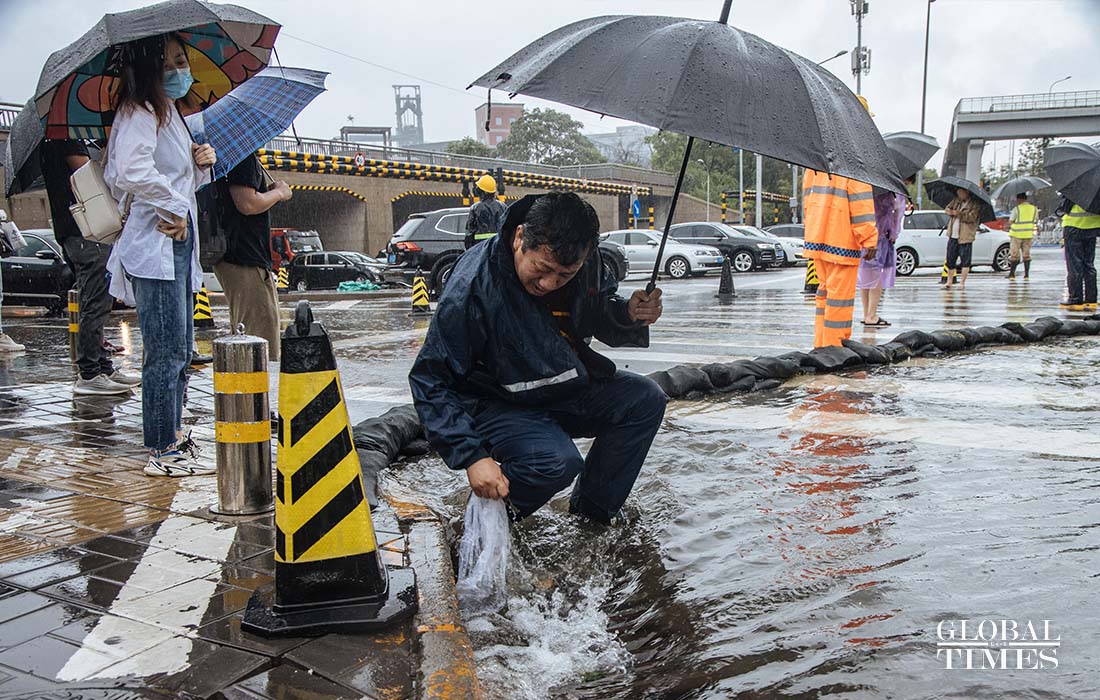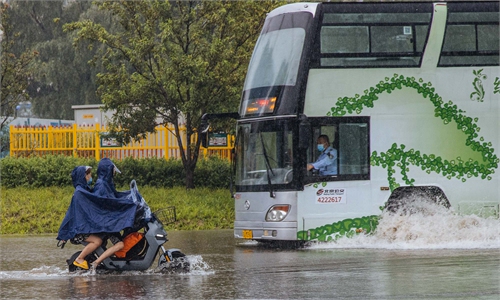Capital Beijing withstands test of rainstorm, floods; well-prepared for extreme weather
Accurate weather forecast, early warning mechanism contribute to better emergency response

Beijing residents ride forward in heavy rain, experiencing a less busy rush hour on Monday morning as many companies asked employees to work from home or cancel the clock in. Photo: GT/Li Hao
Many still have the painful memories of July 2012 in their minds, when the heaviest rainfall in 60 years suddenly struck Beijing - the Chinese capital which is characterized by a generally dry climate and lesser rainfall. The downpour ended up killing 79 people, affecting thousands of homes and disrupting main transport networks. For years, local residents often said that one way to test whether the capital is modernized enough is a heavy rainfall.
Therefore, when the emergency response department of the capital kept alerting local residents repetitively this time, almost the entire nation was curious to see how heavy the rainfall would be, so much that over thousands of netizens even waited on live-streaming platforms to watch when the downpours would come.
As Monday night fell, the city lifted the yellow warning and beautiful photos and videos of the Forbidden City washed by rain have gone viral online. Many Beijing residents said they felt relieved and believe this time, Beijing withstood the test.
In recent years, with the increasing number of extreme weather events hitting the country, each cruel lesson China has learned sounded an alarm to the Chinese people. Many observers pointed out an evident progress that China has made in improving its emergency response capability and the more efforts China is making to improve and adjust itself.
Especially after having witnessed countries like the US, which used to be viewed as a benchmark of modern governance, falling down from the altar in dealing with extreme weather events, observers believe that Chinese society and local governments attach great importance to drawing lessons from any mistake or misconduct, and this is why the country has made rapid progress in recent years.

Photo: Li Hao/GT
Accurate, fast early warning
Cities and provinces in North China including Beijing, Tianjin and Hebei have been soaked by heavy rain starting Sunday night. The rain may not end until Tuesday.
Beijing has issued warning signals for rainstorms, floods and heavy winds to citizens constantly since Saturday. The city announced the suspension of kindergartens and primary and secondary schools on Monday. A number of tourist sites in suburban mountainous areas have been temporarily closed.
All outdoor sports, cultural and commercial activities have been suspended from Sunday night. The municipal government also suggested that commuters should stagger their commute to work or work from home.
Beijing's two airports adjusted and cancelled hundreds of flights on Monday morning. The subways postponed the last train time and bus companies opened several additional temporary lines.
Since the rainfall warning was issued, more than 10,000 employees have been on duty for operations, and more than 1,200 emergency rescue personnel have been kept on standby at all times.
On Monday, Chinese netizens also found it funny to see a post on Twitter which showed a soaked subway in New York City and some Americans saying they surprisingly found that the US looks like China. Such comments were mocked by their compatriots who posted a picture of a clear, modern Chinese subway station. Under the photo, a US netizen wrote: "Actually no. This is China's subway system. Wildly better than ours even on a good day. Americans are living in dissolution."
Such dissolution might have also occurred in the latest winter when Americans asked how does the US, the most powerful country in the world, keep failing so astonishingly in responding to natural disasters as they watched in disbelief when a winter storm swept through parts of the country, leaving over 30 people dead and several million without power.
Wang Hongwei, a professor at the Renmin University of China's School of Public Administration and Policy, told the Global Times on Monday that over the years, China's overall capabilities in combating extreme weather events have largely been boosted. The most evident change is China's weather forecast system being more accurate than before.
Zhang Mingying, a Beijing-based meteorologist, told the Global Times that China is able to forecast major meteorological developments more accurately three days before they actually happen with the help of radars and satellites.
It seems that rains of such intensity in Beijing is not as heavy as many people imagined but it fits with the forecast and is defined as a "rainstorm," which means the rainfall within 24 hours in most areas of Beijing has surpassed 100 millimeters.
Wang noted that since 2018 when the Ministry of Emergency Management was set up to forestall and diffuse serious and major risks and improve disaster relief, China has comprehensively leveled up its emergency response capabilities. Moreover, advanced technologies have been used to facilitate in helping combat extreme weather.
Taking China's BeiDou Navigation Satellite System as an example. It played a significant role in safeguarding the timely transmission of the flood situation, checking for dangers by analyzing geographic and geomorphic conditions and providing effective early warnings.
Also drawing upon lessons from 2012, Beijing has been upgrading its drainage system to prevent damage during torrential rainstorms, Wang said.

Photo: Li Hao/GT
Learning from cruel lessons
Apart from Beijing, other provinces also encountered varying degrees of heavy rainfall during the rainy season. Earlier last week, heavy rainfall in Southwest China's Sichuan Province affected 589,400 people, with 109,900 people relocated.
It was estimated that the heavy rain might cause floods in 14 small and medium-sized rivers, including the tributaries of the Qujiang in Sichuan and Hanjiang in Shaanxi.
The State Flood Control and Drought Relief Headquarters have dispatched three working teams to Shanxi, Hebei and Beijing to assist local authorities.
Experts noted that China has learned several bitter lessons, which pushed the country to forge ahead cautiously and steadily.
The latest lesson is the ultramarathon tragedy in Baiyin, Northwest China's Gansu Province that killed 21, including the country's best long-distance runners, amid extreme cold weather. The provincial government later released an 18,000 word-long report, slamming poor management and unprofessional operation and execution.
Some 27 government officials and organizations involved in the race were held responsible for the tragedy, including senior local officials. Five people from the company that organized the race were arrested and will face criminal charges.
Zhang, the meteorologist, also warned about tornadoes and heavy hail, weather phenomena that lasts for a short period of time but is extremely intense, however forecasts remain relatively weak. For example, the probability of the occurrence of a tornado itself is extremely low, and has characteristics such as being small scale, with strong suddenness and a short duration.
Several tornadoes have hit Chinese cities this year, causing deaths, as more extreme weather events strike the world.




